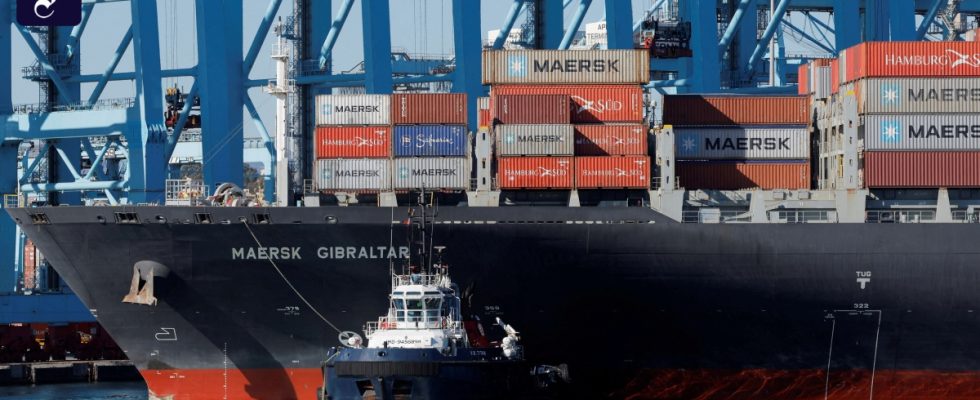Dhe largest container shipping company in the world, MSC, will no longer send ships through the Suez Canal for the time being. This is a response to the attack on one of its freighters, the Swiss-based Mediterranean Shipping Company (MSC) announced on Saturday.
Houthi rebels in Yemen said they attacked the Liberian-flagged “Palatium III” with a drone in the Strait of Bab al-Mandab at the southern end of the Red Sea on Friday. MSC said the ship had suffered fire damage and needed repairs. Crew members were not injured.
Travel times are lengthening
MSC said it would route some ships around the Cape of Good Hope at the southern tip of Africa. This will extend the journey times of ships booked to transit the Suez Canal by a few days.
In London, British Defense Secretary Grant Shapps announced that the warship HMS Diamond had shot down a suspected attack drone that targeted merchant ships in the Red Sea. “A Sea Viper missile was fired and successfully destroyed the target,” he wrote on X. Further attacks on freighters in the region were also reported on Friday, including on a German Hapag-Lloyd ship.
The Iran-backed Houthis had attacked several ships in the Red Sea in recent weeks. In connection with the Suez Canal, the passage is particularly important for the oil trade in order to avoid costs for shipping around Africa. The Bab al-Mandab Strait connects the Red Sea with the Gulf of Aden. It is one of the world’s most important routes for the shipping of raw materials, especially crude oil and fuel from the Gulf. The rebels, who control much of Yemen, have pledged to continue their attacks until Israel ends its offensive.
After the attacks on merchant ships, the shipping companies Maersk and Hapag-Lloyd announced on Friday that they would not send any more ships through the Suez Canal for the time being. A decision on the situation will be made again on Monday, a spokesman for the Hamburg-based shipping company Hapag-Lloyd told the dpa news agency on Friday. The Danish shipping company Maersk said it was deeply concerned about the escalated security situation in the southern Red Sea and the Gulf of Aden. The recent attacks are alarming and pose a significant threat to the safety of seafarers.
On Friday, the Hapag-Lloyd freighter “Al Jasrah” was attacked in the strait between Yemen and Djibouti. “There is material damage on board, the crew is unharmed,” said the shipping company’s spokesman. Containers in particular were damaged; the structure of the ship was not affected. The ship was able to continue its journey. According to the information, the freighter had sailed from Piraeus in Greece through the Suez Canal and was heading towards Singapore. According to media reports, there was a fire on board after the shelling.
The origin of the shelling is still unclear
The federal government condemned the attack and is considering a US request for a naval deployment. Foreign Minister Annalena Baerbock spoke of an attack by the Shiite Houthi rebels in Yemen. “The federal government strongly condemns all attacks on ships, including of course the attack on the Hapag-Lloyd ship,” said the Green politician on Friday during a visit to Berlin by acting Lebanese Foreign Minister Abdallah Bou Habib. “The Houthis’ attacks on civilian merchant ships in the Red Sea must stop immediately,” she demanded.
Defense Minister Boris Pistorius (SPD) said during a visit to Wunstorf near Hanover: “We are currently examining the request and the options that exist. But we are not yet at the end of the test.” A spokesman for the Ministry of Defense explained in Berlin that a few days ago the USA made a request to the German Navy as to whether it would be able to provide support in the Red Sea, “without that it was specifically backed with demands.”
The Hapag Lloyd spokesman was initially unable to provide any information about the origin of the shelling on the “Al Jasrah”. The Houthis have claimed responsibility for attacks on other freighters, but have not yet commented on the shelling of the “Al Jasrah”. Because of the repeated attacks by the Houthis in the Red Sea, German shipowners only called for protective measures from the federal government and the EU on Thursday. With over 1,800 ships, the German merchant fleet is the seventh largest among the world’s major merchant fleets.
According to National Security Advisor Jake Sullivan, the United States is working with the international community, regional partners and around the world to find solutions to address the threat. “We are forming a coalition,” Sullivan said during a news conference Friday. The Houthis therefore pose a significant threat to freedom of navigation, commercial shipping and legitimate trade along a vital artery on the Bab al-Mandeb and the Red Sea. Iran, as the mastermind behind the Houthi attacks, is responsible for taking measures to stop the attacks, said Sullivan.

